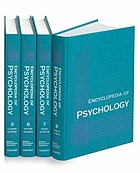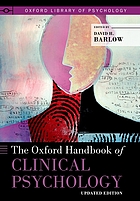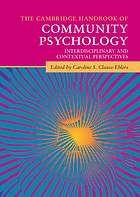Dictionaries, Handbooks & Encyclopedias
Dictionaries, encyclopedias, handbooks and key reference sources are useful in defining terms and concepts and obtaining an overview of the area you are researching.
Below is a sample of what's available. Search the library collection for more.
-
 Dictionary of Psychology and Allied Sciences
by
This book will prove beneficial for psychology & medical undergraduate and postgraduate students. Also it is useful for civil service aspirants and students preparing for various other competitive examinations. This dictionary is specifically written in a simple language for easy grasping of psychology and allied sciences. About 8000 wards used in the fields of psychiatry, psychology and neurology have been arranged in an alphabetical order along with their definitions. Some of the important terms of psychology and allied science related with India have also been included. This book will act as a supplement to Textbook of Clinical Psychology written by same author and published by the same publishers.
ISBN: 8122429491Publication Date: 2009
Dictionary of Psychology and Allied Sciences
by
This book will prove beneficial for psychology & medical undergraduate and postgraduate students. Also it is useful for civil service aspirants and students preparing for various other competitive examinations. This dictionary is specifically written in a simple language for easy grasping of psychology and allied sciences. About 8000 wards used in the fields of psychiatry, psychology and neurology have been arranged in an alphabetical order along with their definitions. Some of the important terms of psychology and allied science related with India have also been included. This book will act as a supplement to Textbook of Clinical Psychology written by same author and published by the same publishers.
ISBN: 8122429491Publication Date: 2009 -
-
The ACA Encyclopedia of Counseling by This premiere counseling reference book is ideal for students, educators, supervisors, researchers, and practitioners seeking to quickly update or refresh their knowledge of the most important topics in counseling. More than 400 entries span the 2009 CACREP core areas used in counselor preparation, continuing education, and accreditation of counseling degree programs, making this a perfect text for introductory counseling classes or for use as a study guide when preparing for the National Counselor Exam. This encyclopedia makes counseling come alive through its user-friendly writing style; instructive examples that connect readers to practice, teaching, supervision, and research; and its helpful cross-referencing of entries, boldfaced important terminology, and suggested resources for further study. *Requests for digital versions from ACA can be found on www.wiley.com. *To purchase print copies, please visit the ACA website *Reproduction requests for material from books published by ACA should be directed to permissions@counseling.org
ISBN: 9781119025436Publication Date: 2015 -
 Encyclopedia of Psychology
by
"The American Psychological Association, under the editorial direction of Alan Kazdin, has produced an exceptional multidisciplinary and multicultural encyclopedia."--"Outstanding Reference Sources," American Libraries, May 2001.
ISBN: 9781557986504Publication Date: 2000-01-01
Encyclopedia of Psychology
by
"The American Psychological Association, under the editorial direction of Alan Kazdin, has produced an exceptional multidisciplinary and multicultural encyclopedia."--"Outstanding Reference Sources," American Libraries, May 2001.
ISBN: 9781557986504Publication Date: 2000-01-01 -
International Encyclopedia of the Social and Behavioral Sciences by Fully revised and updated, the second edition of the International Encyclopedia of the Social and Behavioral Sciences, first published in 2001, offers a source of social and behavioral sciences reference material that is broader and deeper than any other. Available in both print and online editions, it comprises over 3,900 articles, commissioned by 71 Section Editors, and includes 90,000 bibliographic references as well as comprehensive name and subject indexes. Provides authoritative, foundational, interdisciplinary knowledge across the wide range of behavioral and social sciences fields Discusses history, current trends and future directions Topics are cross-referenced with related topics and each article highlights further reading
ISBN: 9780080970875Publication Date: 2015-02-17 -
Psychology: the Key Concepts by Psychology: The Key Concepts is a comprehensive overview of 200 concepts central to a solid understanding of Psychology and includes the latest recommendations from the British Psychology Society (BPS). The focus is on practical uses of Psychology in settings such as nursing, education and human resources, with topics ranging from Gender to Psychometrics and Perception.
ISBN: 9780203892930Publication Date: 2008-08-18 -
The SAGE Encyclopedia of Social Science Research Methods by The SAGE Encyclopedia of Social Science Research Methods, a three-volume resource that is a first of its kind, developed by the leading publisher of social science research methods books and journals. This unique multi-volume reference set offers readers an all-encompassing education in the ways of social science researchers.
ISBN: 9781452261454Publication Date: 2004
Click the following link to find the large range of APA Psychology Handbooks in the library holdings
-
 The Oxford Handbook of Clinical Psychology
by
The exponential growth of clinical psychology since the late 1960s can be measured in part by the extensive-perhaps exhaustive-literature on the subject. This proliferation of writing has continued into the new century, and the field has come to be defined as much by its many topics as its many voices.The Oxford Handbook of Clinical Psychology synthesizes these decades of literature in one extraordinary volume. Comprising chapters from the foremost scholars in clinical psychology, the handbook provides even and authoritative coverage of the research, practice, and policy factors that combine to form today's clinical psychology landscape.In addition to core sections on topics such as training, assessment, diagnosis, and intervention, the handbook includes valuable chapters devoted to new and emerging issues in the clinical field, including heath care reforms, cultural factors, and technological innovations and challenges. Each chapter offers a review of the most pertinent literature, outlining current issues and identifying possibilities for future research.Featuring two chapters by Editor David H. Barlow -- one on changes during his own 40-year odyssey in the field, the other projecting ten themes for the future of clinical psychology -- The Oxford Handbook of Clinical Psychology is a landmark publication that is sure to serve as the field's benchmark reference publication for years to come. It is an essential resource for students, clinicians, and researchers across the ever-growing clinical psychology community.
ISBN: 9780199328727Publication Date: 2014-01-01
The Oxford Handbook of Clinical Psychology
by
The exponential growth of clinical psychology since the late 1960s can be measured in part by the extensive-perhaps exhaustive-literature on the subject. This proliferation of writing has continued into the new century, and the field has come to be defined as much by its many topics as its many voices.The Oxford Handbook of Clinical Psychology synthesizes these decades of literature in one extraordinary volume. Comprising chapters from the foremost scholars in clinical psychology, the handbook provides even and authoritative coverage of the research, practice, and policy factors that combine to form today's clinical psychology landscape.In addition to core sections on topics such as training, assessment, diagnosis, and intervention, the handbook includes valuable chapters devoted to new and emerging issues in the clinical field, including heath care reforms, cultural factors, and technological innovations and challenges. Each chapter offers a review of the most pertinent literature, outlining current issues and identifying possibilities for future research.Featuring two chapters by Editor David H. Barlow -- one on changes during his own 40-year odyssey in the field, the other projecting ten themes for the future of clinical psychology -- The Oxford Handbook of Clinical Psychology is a landmark publication that is sure to serve as the field's benchmark reference publication for years to come. It is an essential resource for students, clinicians, and researchers across the ever-growing clinical psychology community.
ISBN: 9780199328727Publication Date: 2014-01-01 -
 The Cambridge Handbook of Community Psychology
by
This comprehensive handbook provides community psychology approaches to addressing the key issues that impact individuals and their communities worldwide. Featuring international, interdisciplinary perspectives from leading experts, the handbook tackles critical contemporary challenges. These include climate change, immigration, educational access, healthcare, social media, wellness, community empowerment, discrimination, mental health, and many more. The chapters offer case study examples to present practical applications and to review relevant implications within diverse contexts. Throughout, the handbook considers how community psychology plays out around the world: What approaches are being used in different countries? How does political context influence the development and extension of community psychology? And what can nations learn from each other as they examine successful community psychology-based interventions? This is essential reading for researchers, students, practitioners, and policy makers involved with community well-being.
ISBN: 9781108678971Publication Date: 2021-12-16
The Cambridge Handbook of Community Psychology
by
This comprehensive handbook provides community psychology approaches to addressing the key issues that impact individuals and their communities worldwide. Featuring international, interdisciplinary perspectives from leading experts, the handbook tackles critical contemporary challenges. These include climate change, immigration, educational access, healthcare, social media, wellness, community empowerment, discrimination, mental health, and many more. The chapters offer case study examples to present practical applications and to review relevant implications within diverse contexts. Throughout, the handbook considers how community psychology plays out around the world: What approaches are being used in different countries? How does political context influence the development and extension of community psychology? And what can nations learn from each other as they examine successful community psychology-based interventions? This is essential reading for researchers, students, practitioners, and policy makers involved with community well-being.
ISBN: 9781108678971Publication Date: 2021-12-16 -
The New Handbook of Counseling Supervision by The second edition of this ground-breaking book continues the mission of its predecessor: to provide a "best principles" and "best practices" overview of the counseling supervision process, one that is firmly rooted in the recent explosion of empirical research in this field. Sponsored by the Association for Counselor Education and Supervision (ACES), the presentation is targeted primarily at master's-level practitioners who want "how-to" applications of the research literature (with examples) rather than a comprehensive review of the supervision literature. Like the first edition, this revised book is also a useful supplement for more academic texts used for doctoral-level instruction in counseling supervision. Key changes in this new edition include greater attention to multicultural and diversity issues and new chapters on group supervision and on technology. Also new are discussion questions and vignettes meant to enhance application of key concepts in each chapter as well as more sample materials and forms for practice.
ISBN: 9780805853698Publication Date: 2005-07-20 -
Counseling Around the World by This fascinating book provides a global exchange of information about counseling activities and services; counselor training; and existing professional practices, beliefs, and values. Native counselors and leading experts from 40 countries discuss the opportunities for growth in their countries and the challenges they face. After an introductory section that discusses global diversity themes and issues, chapters focus on key countries in Africa, Asia, Europe, the Middle East, North America, Oceania, and South and Central America. Each chapter covers the history and current state of counseling in the country, theories and techniques that have been shown to work best in meeting the needs of the population, diversity issues specific to the region, counselor education and training, and possibilities for the future of counseling in the country. A comprehensive list of international resources and counseling organizations is also included. *Requests for digital versions from ACA can be found on www.wiley.com. *To purchase print copies, please visit the ACA website *Reproduction requests for material from books published by ACA should be directed to permissions@counseling.org.
ISBN: 9781119026419Publication Date: 2015-01-12 -
APA Handbook of Counseling Psychology by The field of counselling psychology is characterised by long roots in vocational psychology, prevention, primary interventions, advocacy, and an emphasis on individual differences. The field's fundamental philosophical approach has historically emphasised human strengths, well being, and prevention. Over the years, this approach has led to emerging emphases on cultural context, dimensions of diversity, the role of work in people's lives, and expanded roles for counselling psychologists in new settings, contexts, and with new populations. This handbook will both highlight the practices in counselling psychology's traditional areas as well as in new and emerging areas.
ISBN: 9781433811074Publication Date: 2012-06-15 -
-
-
